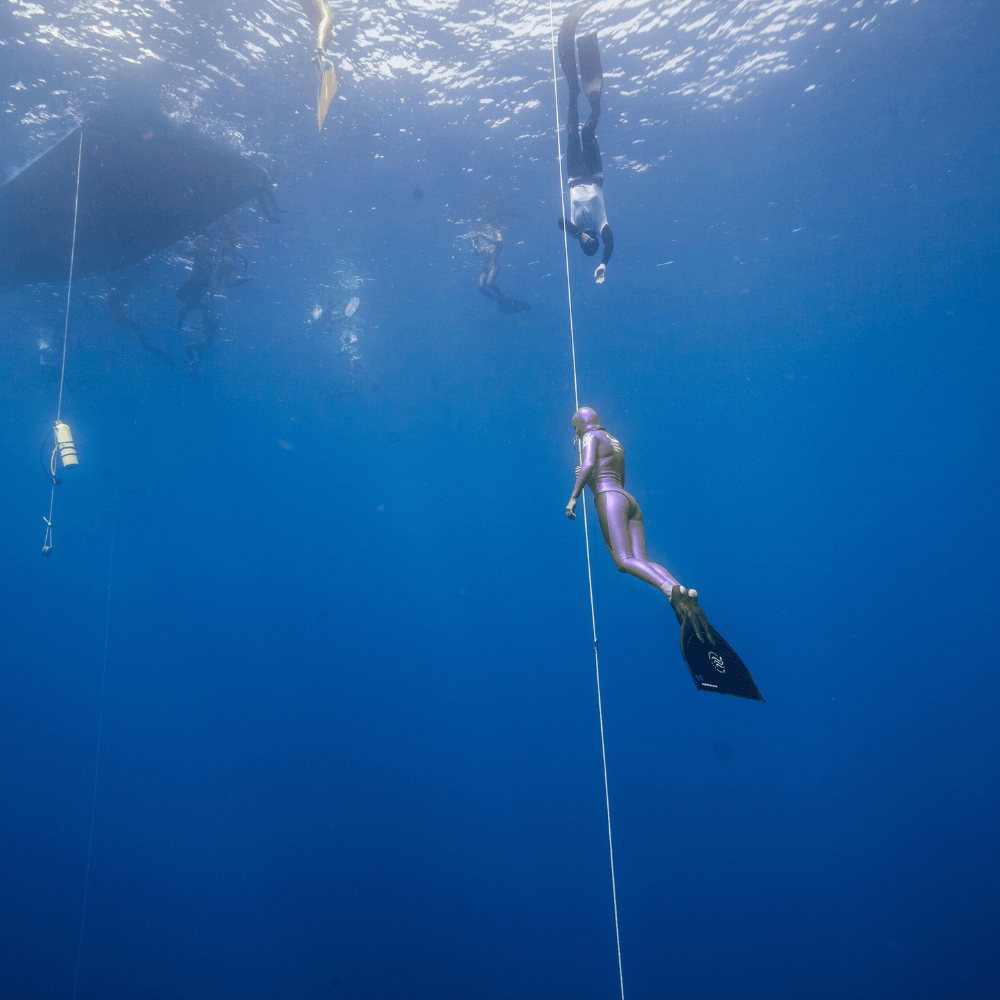Breathing for Balance: Honoring World Mental Health Day

On World Mental Health Day, we celebrate kindness, calm and the power of breath
Written by Deena Lynch & Jeremy Storton
Freediving teaches us that where the breath goes, the mind will follow © @deenajonze
When we are sick, we see the doctor; when we are injured, a physical therapist; and when we need to improve our performance, we see a coach. But when it comes to mental health, our collective strategy too often seems to be to suppress and ignore.
October 10th is when the world sets out to make a change. World Mental Health Day raises awareness and support for mental well-being on a global scale, with the goal of ensuring that everyone has access to care and support.
For many of us, freediving has become a sacred practice for cultivating mental balance and resilience. After all the breathwork, meditation, physical training, and time spent looking inward, we discover that the nervous system becomes calm and regulated. Freediving isn’t the solution for mental health, but it is a beautiful supplement to pave the way for building healthy behaviour patterns in our daily lives.
On this World Mental Health Day, we invite you to bring peace to your challenges and focus on your mental fitness by training like a freediver with us.
And here’s the good news: you don’t even have to get wet. Breathwork, especially in the context of freediving, can bring calm, focus, and emotional regulation that carries well beyond the water.
Mental Health Benefits of Breathwork
Reduces Stress & Anxiety
Slow, controlled breathing signals the nervous system to shift out of “fight or flight” and into “rest and digest.” This lowers the stress hormone cortisol and helps calm the mind.
Improves Emotional Regulation
Breath awareness creates space between stress triggers and emotional reactions, making it easier to respond calmly rather than react impulsively.
Enhances Focus & Clarity
By increasing oxygen delivery and calming mental chatter, breathwork supports better concentration and decision-making.
Supports Trauma Healing
Gentle breathwork can release stored tension and reduce hypervigilance.
Improves Sleep Quality
Breath techniques that emphasize slow exhalation and diaphragmatic breathing reduce nighttime restlessness and prepare the body for restorative sleep.
Well-Being Benefits of Breathwork (Mental Fitness)
Boosts Resilience
CO₂ tolerance training helps you stay calm under stress and makes everyday challenges feel more manageable.
Increases Energy
Efficient breathing improves oxygen uptake, circulation, and vitality.
Builds a Mind–Body Connection
Breathwork grounds you in the present moment, creating awareness of the body and fostering mindfulness.
Physical Relaxation
It can ease muscle tension, lower heart rate, and reduce blood pressure, which feeds into both physical and emotional wellbeing.
Sense of Empowerment
Breath is always accessible — learning to control it gives a powerful tool for self-care, no matter the situation.
Take a Deep Breath
World Mental Health Day reminds us that caring for our minds doesn’t always mean grand gestures. Sometimes it’s as simple as a deep breath, a laugh with fellow freedivers, or a quiet moment in the sun.
Here are two simple breathwork practices you can try today:
-
Square Breathing (Box Breathing):
Inhale for 4 counts → Hold for 4 → Exhale for 4 → Hold for 4.
Repeat for 4–6 cycles. This practice reduces stress and steadies the mind. -
Extended Exhale Breathing:
Inhale gently through the nose for 4 counts → Exhale slowly through the mouth for 6–8 counts.
This activates the parasympathetic nervous system, bringing calm and ease.
These small practices can help you reset in moments of pressure, building resilience that carries into every part of life.
If you’d like to explore breathwork more deeply, you don’t have to be an athlete or even a freediver. With the Foundational Breathwork Course, you’ll be guided step by step by a 39x World Champion freediver Alexey Molchanov, not to chase records, but to discover how breath can support focus, calm, and wellbeing in your daily life.
So today, let’s remind ourselves: it’s okay to slow down, ask for help, and care for our minds as much as our bodies. On World Mental Health Day, we don’t just celebrate resilience, we celebrate kindness and compassion, for ourselves and for each other.
If you or someone you love has experienced trauma, we encourage you to seek help from a qualified mental health professional. You don’t have to go through it alone – support is available and healing is possible.
The information provided in this article is for informational purposes only and is not a substitute for professional medical advice, diagnosis or treatment. Always consult a qualified healthcare provider with any questions you may have regarding a mental health condition. Never disregard professional medical advice or delay in seeking it because of something you have read on a website.




Leave a comment